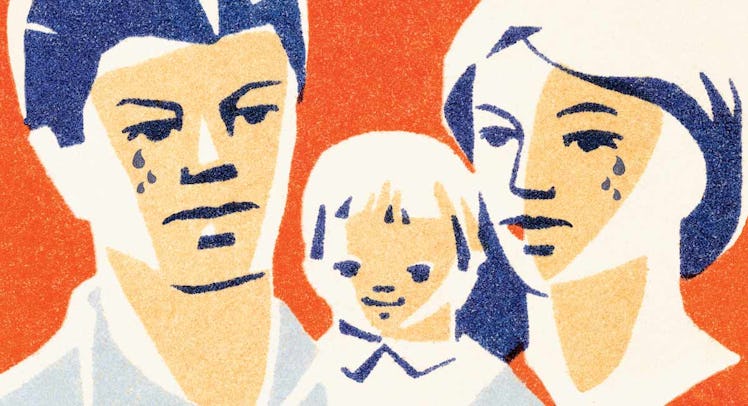Hormones Make the First Year of Fatherhood So Damn Hard
Biological processes play a big role.

First comes love, then comes marriage, then comes that baby in the baby carriage. And then? Well, then comes marital discord, dissatisfaction, and relationship trouble. Or at least that’s often the case, because the first year of your marriage after you have a kid will, if science and statistics teach us anything, likely suck.
There is more stress because there is less sleep and less time and less money, but also because babies come — and no one ever mentions this — with a generous side of self-doubt (“What if I’m a terrible father?”). When the sense of self is disrupted, everything else seems to be as well. What follows is a tough experience psychologically. Being a new dad is great, but it’s also really hard. People don’t talk about this, which exacerbates the issue, but it’s extremely normal.
In fact, Darby Saxbe, an associate professor of psychology at the University of Southern California’s Neuroendocrinology of Social Ties lab, would go so far as to suggest that it’s in our biology to face certain parts of this first year with a mix of anger, sadness, and frustration.
“Feeling irritable, really sad or upset, not enjoying things the way you used to, not being cheered up no matter what, feeling hopeless — these are all normal,” Saxbe explains.
In a recent study she published in the journal Hormones and Behavior, Saxbe makes the case that a natural hormonal drop occurs in men shortly after the birth of their child. This includes a dip in testosterone that contributes to making men a bit more emotionally unstable. “It’s not just testosterone — hormones change in fathers around the birth of a child,” she explains, pointing to animals with a biparental culture also seeing decreases in testosterone.
The drop in testosterone makes evolutionary sense, Saxbe says, since the hormone motivates competition for status and a spike in the urge to mate. “These are not helpful anymore because an infant needs attention,” Saxbe says, so a man’s body decreases its production, enabling him to spend more time with his infant and less time mating. While the exact biological mechanism that causes the dip isn’t quite clear yet, Saxby says “it might have to do with the infant and sharing a living space with a pregnant partner.”
What we do know is that testosterone levels fluctuate throughout a man’s lifetime. And drops are correlated with higher rates of depression, which is what Saxbe was seeking to understand in her study: How does this affect parenthood and a dad’s relationship with his spouse? Turns out, the mood swing caused by dropping testosterone is compounded by shifting dynamics as a partner recovers mentally and physically from birth (or even the psychological shock of adoption). In fact, Saxbe says, the whirlwind of emotions that a couple feels — joyful bliss, shock and awe, a realization that this little spawn is completely reliant on you — can (and most often, does) spin both partners into a tornado of emotions that lead to depression.
Sometimes these emotions could spiral into postpartum depression in one or both partners — a serious situation that requires regular help and a network of support. But at the very least, it issues feelings of resentment and lingering thoughts that your old routine will never return.
“You can’t do the things you enjoy, and your sleep is disrupted,” Saxbe says. “It’s a lot to get through the day, and now you have a source of conflict: How do you split up money? What are your new relationships with extended family?”
In other words, you might think that your relationship with your partner crashed after the birth of your baby, but the reality — chemical imbalances, societal pressure, and new family dynamics — are much more complicated. Saxbe says that her research found that it’s fairly simple to deal with the birth of a newborn and ease marital tension with your wife: sleep more. “Make sleep your number one priority,” she suggests. “Go to bed earlier, take naps, and skip the show. And make time to see your friends: The first year is hard, but seeing them helps.”
Saxbe says that while the classic myth of the first year of marriage after the birth of a child has a pretty dismal reputation, it can actually be good — so long as you don’t expect it to be great.
“Lower your expectations, and know that having a baby is a lot of work,” Saxbe suggests. If you think you’re going to be SuperDad and that wiping asses in the middle of the night and sticking a bottle in an infant’s face is going to be simple, you’re going to be in for a rude surprise, and your marriage is going to suffer.
In fact, the best thing that you can do to help your marriage thrive in this critical phase of your relationship? Be sure you are clear on exactly how you will share baby care — before the baby arrives. Uneven division of labor can create resentment, lead to disagreements, passive-aggressiveness, and fights, all of which can be avoided if you take a few minutes to talk it out before a wailing child made it necessary.
“Having a baby is not easy,” Saxbe says in a much-needed understatement. “But having a baby can also be great for a relationship — if you put in the work.”